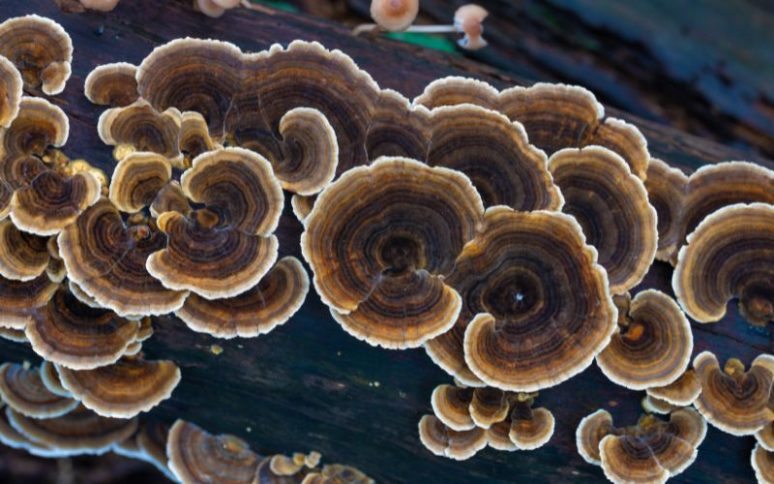The Incredible Benefits of Turkey Tail Mushroom

Disclosure: This post may contain affiliate links. As an Amazon Associate, we earn from qualifying purchases.
Introduction
Welcome to our comprehensive guide on the Turkey Tail Mushroom. This remarkable organism has garnered significant attention for its potential health benefits and versatile uses. Known scientifically as Trametes versicolor, it is easily recognized by its vibrant, multicolored appearance resembling a turkey’s tail.
The Turkey Tail Mushroom grows on decaying wood and can be found in forests around the world. It has been a staple in traditional medicine for centuries. Its unique properties have made it a subject of interest for researchers exploring its medicinal value.
In this article, we will explore the nutritional value, health benefits, and scientific research behind the Turkey Tail Mushroom. We’ll also discuss its applications in natural health remedies. From immune system support to its potential role in cancer therapy, this mushroom offers a wide range of benefits.
The Turkey Tail Mushroom also has a rich history in traditional Chinese medicine. Ancient wisdom continues to influence modern health practices, demonstrating the enduring relevance of this extraordinary fungus.
Whether you are a mushroom enthusiast curious about its unique traits, a health-conscious individual seeking natural supplements, or someone exploring alternative remedies, this article is for you. Dive in and discover the fascinating world of the Turkey Tail Mushroom.

Nutritional Value of Turkey Tail Mushroom
The Turkey Tail Mushroom is a rich source of essential nutrients and bioactive compounds, making it a standout in the world of functional foods. One of its most notable components is polysaccharide-K (PSK), a compound widely studied for its immune-modulating effects. PSK has been shown to enhance immune cell activity, particularly by stimulating T-cells and natural killer (NK) cells, which play a critical role in defending the body against infections and abnormal cell growth. Similarly, polysaccharide-peptide (PSP), another key compound, offers comparable immune-supporting benefits and has been linked to improved immune responses in various studies.
In addition to PSK and PSP, Turkey Tail Mushrooms are an abundant source of beta-glucans, a type of soluble fiber with impressive health-promoting properties. Beta-glucans are known to activate immune cells such as macrophages, dendritic cells, and lymphocytes, making them essential for maintaining a robust and adaptive immune system. These compounds have also been linked to reduced inflammation, improved gut health, and better overall immune regulation.
The mushroom is also packed with antioxidants, which help combat oxidative stress and protect the body’s cells from damage caused by free radicals. Key antioxidants found in Turkey Tail Mushrooms include phenols and flavonoids, both of which have been associated with reduced inflammation, enhanced immune response, and potential anti-aging effects. These antioxidants work synergistically with other nutrients to support cellular health and reduce the risk of chronic diseases.
Turkey Tail Mushrooms also contain important prebiotic fibers that nourish beneficial gut bacteria, promoting a balanced microbiome. A healthy gut is foundational to overall health, as it influences everything from digestion to immunity and mental well-being.
With its unique combination of immune-modulating compounds, antioxidants, and prebiotic fibers, the Turkey Tail Mushroom stands out as a nutrient-dense powerhouse. It offers a natural way to support immune health, fight oxidative stress, and maintain a healthy gut microbiome. To explore more about its nutritional value and health benefits, visit this article on Turkey Tail Mushroom research for detailed insights.
Health Benefits of Turkey Tail Mushroom
The health benefits of Turkey Tail Mushroom are impressive and wide-ranging. This mushroom has been used in both traditional and modern medicine to support health and well-being. Its biggest strength is its ability to boost the immune system. Key compounds like polysaccharide-K (PSK) and polysaccharide-peptide (PSP) help the body fight off infections. These compounds activate important immune cells such as T-cells and natural killer (NK) cells, which are the body’s natural defenders.
Key Health Benefits of Turkey Tail Mushroom:
- Supports Cancer Treatment:
- In Japan, PSK is approved as a treatment alongside chemotherapy. Research suggests it may:
- Reduce tumor growth
- Improve survival rates
- Strengthen the immune system during chemotherapy and radiation therapy
- Learn more from this NIH study on Turkey Tail Mushroom and cancer therapies.
- Reduces Inflammation:
- Chronic inflammation can lead to conditions like heart disease, arthritis, and diabetes. Compounds in Turkey Tail Mushroom help lower inflammation, promoting better long-term health.
- Provides Antioxidants:
- Turkey Tail is rich in antioxidants like flavonoids and phenols, which:
- Protect cells from damage caused by free radicals
- Slow down aging
- Reduce the risk of chronic diseases
- Explore more about antioxidants in mushrooms here.
- Fights Harmful Bacteria and Viruses:
- The mushroom’s antimicrobial properties help the body combat infections, giving extra protection during illnesses.
- Improves Gut Health:
- Turkey Tail contains prebiotics, which feed good bacteria in the gut. A healthy gut:
- Boosts immunity
- Improves digestion
- Positively impacts mood
Overall, Turkey Tail Mushroom is a powerful natural supplement with many benefits. It can support the immune system, fight inflammation, protect against cell damage, and improve gut health. Whether consumed as tea or in supplement form, it’s an excellent addition to a healthy lifestyle.
Research and Studies on Turkey Tail Mushroom
Research and Studies on Turkey Tail Mushroom
Turkey Tail Mushroom has been the subject of extensive research and numerous studies, revealing a wealth of fascinating insights into its medicinal properties and potential health benefits. The scientific community has been captivated by the therapeutic potential of this remarkable fungus, leading to an array of investigations aimed at unraveling its biological mechanisms and applications.
One of the most significant areas of study revolves around the anti-cancer properties of Turkey Tail Mushroom. In recent years, researchers have made significant strides in understanding the compounds present in this mushroom that contribute to its potent anti-cancer effects. Through meticulous laboratory experiments and clinical trials, these compounds have been found to exert inhibitory effects on the proliferation of cancer cells, while also bolstering the body’s innate defense mechanisms against the development and progression of cancerous growths.
Furthermore, the immune-enhancing properties of Turkey Tail Mushroom have been a focal point of scientific inquiry. Studies have shown that specific bioactive compounds within the mushroom play a pivotal role in modulating and strengthening the immune system. This has implications not only in combating cancer but also in addressing various immune-related disorders and enhancing overall well-being.
Moreover, the impact of Turkey Tail Mushroom on gut health and the microbiome has garnered significant attention from researchers. The intricate relationship between the compounds present in the mushroom and the gut microflora has been a subject of exploration, with promising findings suggesting potential therapeutic applications in the realm of digestive health and metabolic balance.
Conclusion
In conclusion, the Turkey Tail Mushroom stands as a testament to the therapeutic potential of natural organisms.
Its nutritional value, health benefits, and extensive research validate its status as a valuable contributor to holistic health.
As we continue to unravel the mysteries of natural medicine, the Turkey Tail Mushroom shines bright as a beacon of hope for those seeking alternative healthcare solutions.
